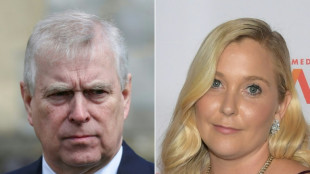

Montreux Jazz Festival hails 'godfather' Quincy Jones
Quincy Jones was the godfather of the Montreux Jazz Festival and was instrumental in bringing different styles to the stage, the event's chief executive told AFP on Monday.
Music industry titan Jones, who died on Sunday aged 91, co-produced the Swiss festival from 1991 to 1993 -- and returned to Lake Geneva every summer until 2019 to perform and immerse himself in the sounds.
"He came every year, spending time with us, listening to music, advising us. He was like a big godfather to the Montreux Jazz Festival," chief executive Mathieu Jaton said.
"It's a very big page which has turned," he said.
"What he did for the festival will last forever."
Jones's influence steered Montreux into blending styles and artists. The festival is now a magnet for big names as well as for rising stars, having dramatically expanded its repertoire beyond its jazz beginnings.
Jaton said jazz hero Jones and the festival's founder Claude Nobs had "exactly the same vision" for the event, which sparked criticism in the 1990s for bringing in hip-hop and Latin music.
"He was deep into the music and always bringing a lot of different people on stage to play together," said Jaton.
"He was mixing all kinds of music -- if the music was good.
"That put Montreux on the map in a totally different way. It was the festival where musicians can express themselves and enjoy playing with other musicians," he said.
- 'Passionate about music' -
Jaton said one of Jones's landmark achievements at Montreux was convincing the great jazz trumpeter Miles Davis at last to revisit major works from his past -- just two months before his death in 1991.
The resulting album, "Miles and Quincy: Live at Montreux", won a Grammy Award.
"That was his capacity to bring an artist to a different comfort zone and make a concert which is going to be legendary," said Jaton.
"It was far beyond his musical competence: it was his charisma also. Every single musician wanted to talk to Quincy and be with him.
"He was not behaving like a superstar. He was accessible. He was sitting in the crowd and talking to everyone. And so passionate about music."
While the festival will consider how best to pay tribute to Jones, Jaton said: "I rather prefer when it's coming from the artists themselves, because it's more authentic.
"I will just remember that image of Quincy vibrating on stage, listening to young musicians and making a little sign to me saying, 'who's that guy playing bass? Wow, he sounds really good!'
"That was Quincy: listening to jam sessions and just feeling, 'this guy is great, I want to talk to him' -- and then spending an hour talking to a young guy who's 20 years old.
"He changed the lives of many young artists in Montreux just by talking to them. That's what I have in my heart today: that man."
T.Peeters--JdB



